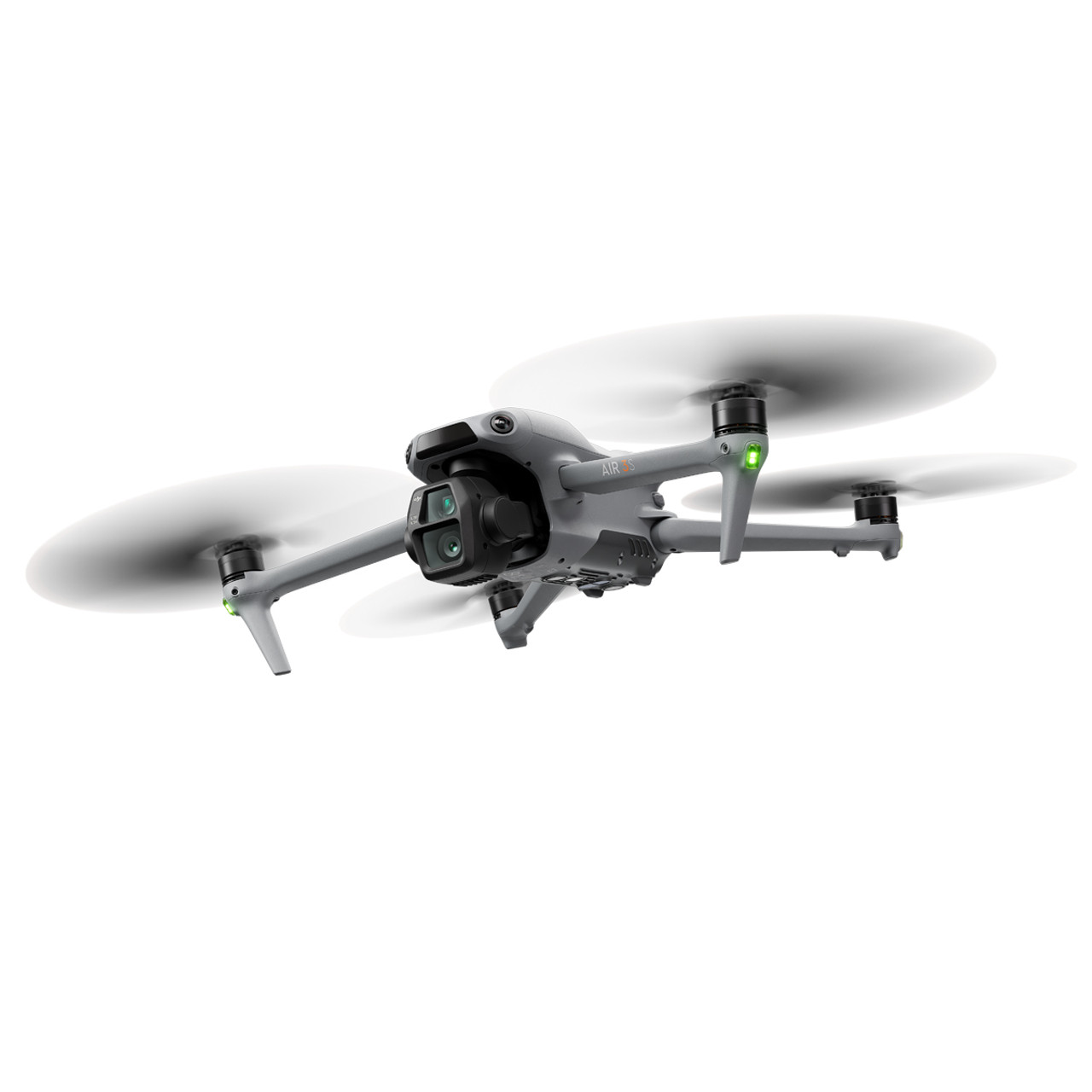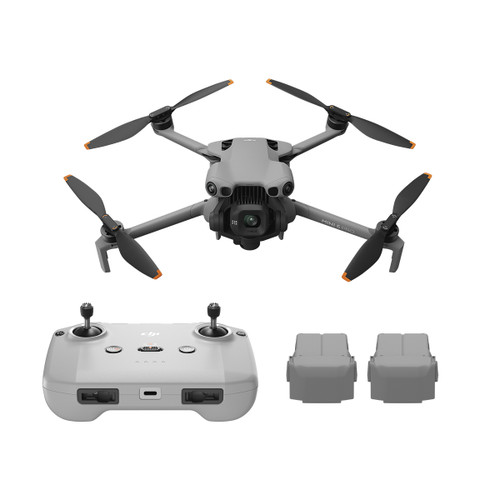Product Description
A dual-camera drone designed for travel photography, DJI Air 3S integrates a suite of advanced technologies. Featuring a 1-inch-CMOS primary camera and a 70mm medium tele camera, each with up to 14 stops of dynamic range, [1] Air 3S captures landscapes, portraits, and more in stunning detail. Both cameras support the new Free panorama feature, which allows flexible shooting-range selections. Additional new highlights include nightscape obstacle sensing [2] and next-gen Smart RTH for enhanced safety during nighttime photography. In each and every way, DJI Air 3S is designed to maximize every aerial moment.
- 1″ CMOS Primary Camera
- Dual-Camera 4K/60fps HDR Video & 14 Stops of Dynamic Range [1]
- Free Panorama, Seamless and Detailed
- Nightscape Omnidirectional Obstacle Sensing [2]
- Next-Gen Smart RTH With Enhanced Precision
- 45-Min Flight Time, [3] 20km Video Transmission [4]
Buy the DJI Air 3S combo at the official online DJI Store. Let DJI experts help you choose, and enjoy one-on-one exclusive customer service, professional technical support, free shipping, 1% DJI Credit back on your purchase, and more.
Dual Cameras, Unmatched Imagery
DJI Air 3S features a dual-camera system consisting of a 1-inch-CMOS primary camera and a 1/1.3-inch-CMOS medium tele camera. The primary camera features a larger CMOS sensor and a 24mm lens, making it ideal for capturing expansive landscapes with enhanced clarity and a wide field of view. The 70mm medium tele camera excels at portrait and vehicle shots, offering compressed depth of field to highlight any subject with a bolder, more cinematic look.
1″ CMOS Primary Wide-Angle Camera:
3.2μm Large Pixel Size [5]
24mm Format Equivalent
50 MP
f/1.8 Aperture
1/1.3″ CMOS Medium Tele Camera:
2.4μm Large Pixel Size [5]
70mm Format Equivalent
48 MP
f/2.8 Aperture
1″ CMOS Primary Camera: Breathtaking Detail for Travel Photography
The primary camera of DJI Air 3S integrates a 50MP 1-inch CMOS sensor, supporting 4K/60fps HDR and 4K/120fps video recording [6] as well as 10-bit D-Log M color mode. This large sensor, enhanced by advanced image-processing technology and intelligent algorithms, preserves even minute details in low-light conditions such as sunsets and nightscapes, delivering shots that are simply, effortlessly breathtaking.
Medium Tele Camera: Unforgettable Portraits
The medium tele camera, with its 48MP 1/1.3-inch CMOS sensor, supports the same video specs and color modes as the primary camera. This ensures visually consistent footage for streamlined post-processing. Its 70mm lens offers 3x optical zoom, allowing you to capture unique shots from a distance while highlighting your subject. And when you use Air 3S to orbit around a subject and record a 4K video, you can easily take detailed and expressive close-up portraits.
Free Panorama
Both the primary camera and medium tele camera of DJI Air 3S offer Free panorama mode, letting you create seamless panoramic shots by stitching together multiple images with a manually selected subject or area. The wide-angle camera offers a broader FOV, boosting efficiency when capturing panorama photos. The medium tele camera significantly reduces image distortion, crafting your masterpieces into expansive shots with a wide perspective from multiple photos and rich details captured through its focal length advantages.
DJI Air 3S also supports user-favorite features like 2.7K vertical shooting, MasterShots, QuickShots, Hyperlapse, and more, putting a massive creative toolkit together in one compact drone.
Safer Nighttime Flying for Expanded Creativity
Omnidirectional Vision Sensing System
DJI Air 3S supports the Advanced Pilot Assistance Systems (APAS). Additionally, as the first DJI drone to feature forward-facing LiDAR, Air 3S also features downward infrared time-of-flight (ToF) sensors and six vision sensors (two at the front, rear, and bottom) to achieve nightscape omnidirectional obstacle sensing. [2] This feature enables the drone to automatically identify and circumvent obstacles, such as buildings, during its flight and return paths, ensuring robust safety for nighttime photography.
Nightscape Omnidirectional Obstacle Sensing
Enhanced Vision Assist
DJI Air 3S's Vision Assist provides a downward view in addition to the front, back, left, and right views to help you better understand your surroundings.
DJI Air 3S also provides Waypoint Flight and Cruise Control, among other advanced features, which allow you to pre-set flight paths and camera actions and quickly lock control stick inputs to unleash creativity.
ActiveTrack 360° for Effortless Visual Appeal
A New Air Aesthetic
DJI Air 3S features ActiveTrack 360° to keep any subject optimally in frame. Based on the surrounding flight environment, it automatically plans a flight path and adjusts framing to ensure stronger shots that keep your subject the center of attention.
Stay Focused
DJI Air 3S introduces a new Subject Focusing feature that keeps your subject in sharp focus, even during manual flight or when the subject moves off-center. This feature allows you to fully concentrate on the more creative aspects of your shots like composition and camera movement.
Extended Flight & Transmission Distance
Serious Air Time: 45-Min Max [3]
With up to 45 minutes of flight time, [3] Air 3S gives you enough time to scout locations, compose, nail your shots, and do it all over again and again.
10-bit O4 Video Transmission
Powered by DJI O4 FHD video transmission technology, Air 3S delivers 10-bit video transmission at 1080p/60fps over distances of up to 20 kilometers. [4] Live feeds are reliably smooth and vivid, with ultra-responsive control for an improved overall flight experience.
DJI Cellular Dongle 2 Compatibility
The DJI Cellular Dongle 2 [8] can be inserted directly into DJI Air 3S for seamless integration without the need for any extra accessories. In case of O4 signal obstruction or interference, you can rely on 4G connectivity for stable video transmission and drone control, enhancing flight safety and reducing disconnection risks.
Attention to Every Detail
Always Ready: 42GB of Built-in Storage
DJI Air 3S comes standard with 42GB of built-in storage. This allows you to start recording right away and avoid having to deal with microSD cards.
Off-State QuickTransfer
You can now send files from your Air 3S to a smartphone even when the drone is powered off. [9] Transfers to a computer can also be done with the drone powered off—simply connect Air 3S via a compatible USB cable.
Battery Charging Hub with Power Accumulation [10]
The Battery Charging Hub supports PD fast charging and a power accumulation function, which allows you to transfer the remaining power of multiple low-power batteries into the battery with the highest remaining power. [10]
* All videos and images on this page were shot using DJI Air 3S by professionals in strict compliance with local laws and regulations and have been variously edited in post-production. All videos and images are for reference only. Actual results may vary. Always observe local laws and regulations and ensure the aircraft has obtained relevant certifications and airspace authorizations before flying.
** All data on this page was collected with a production model of DJI Air 3S in a controlled test environment. Actual experience may vary depending on the environment, usage, and firmware version. DJI Air 3S must be activated via the DJI Fly app before use.
*** It is recommended to use the ActiveTrack 360° feature in open environments. Refer to the user manual for unsupported scenarios or those that may potentially interrupt recording. In complex environments with many obstacles, exercise caution when using Auto mode to ensure flight safety and personal safety.
**** All images, videos, and screen display contents about the product itself on this page are for reference only. Actual product effects (including but not limited to appearance, color, and size) and screen display contents (including but not limited to backgrounds, UI, and illustrations) may vary.
1. 14 stops of dynamic range are achievable for video on Auto mode but not for vertical or slow-motion video.
2. Conditions for enabling nightscape omnidirectional obstacle sensing: The drone's front, back, left, right, or top sides are within range of surfaces with discernible textures with illuminance that exceeds 1 lux. Similarly, the ground below is textured and diffusely reflective with a reflectivity above 20% (such as walls, trees, or people), also in lighting conditions with illuminance higher than 1 lux. DO NOT fly in severe weather conditions, such as in strong winds (wind speed of 12 m/s or more), snow, rain, lightning, or fog. DO NOT fly the aircraft 6,000 m (19,685 ft.) or higher above sea level. DO NOT fly the aircraft in environments where the temperature is below -10° C (14° F) or above 40° C (104° F). DO NOT take off from moving objects, such as cars or boats. DO NOT fly close to reflective surfaces such as water or snow. Otherwise, the vision system may not work correctly. When GNSS signals are weak, fly the aircraft in well-lit environments: the drone's front, back, left, right, and top sides are within range of surfaces with discernible textures with illuminance that exceeds 10 lux. Similarly, the ground below is textured and diffusely reflective with a reflectivity above 20%, also in lighting conditions with illuminance higher than 10 lux. The vision system may not work properly in dim environments. DO NOT fly near areas with magnetic or radio interference. Familiar magnetic or radio interference sources include Wi-Fi hotspots, routers, Bluetooth devices, high-voltage lines, large-scale power transmission stations, radar stations, mobile base stations, and broadcasting towers. Avoid sand entering the aircraft when taking off in desert or beach areas. Fly the aircraft in open areas away from crowds. Buildings, mountains, and trees may block the GNSS signal and affect the onboard compass.
3. Measured by DJI Air 3S flying forward at a constant speed of 32.4 kph in a windless environment at sea level, with Obstacle Avoidance Action set to Brake, in photo mode, and from 100% battery level until 0%. Data is for reference only. Always pay attention to reminders in the app during your flight.
4. Measured in an outdoor, open environment, without interference, and with FCC compliance. The above data shows the farthest communication range for one-way, non-return flights. Always pay attention to reminders in the app during your flight.
5. Achieved with QBC (Quad Bayer Coding) techniques that combine four pixels into one. Not supported when shooting 48MP or 50MP photos.
6. 4K/120fps video recording is only supported in Slow Motion mode.
7. Conditions for memorizing flight paths: The drone's front, back, left, right, and top sides are within range of surfaces with discernible textures with illuminance that exceeds 10 lux. Similarly, the ground below is textured and diffusely reflective with a reflectivity above 20% (such as walls, trees, or people), also in lighting conditions with illuminance higher than 10 lux. If the drone is taking off from a balcony, ensure the usable space is at least 2 meters by 2 meters, and the height above ground is less than 30 meters to ensure a safe return to home. If the drone reaches its altitude limit while ascending around obstacles, it will hover at that height. The pilot will need to fly the drone manually.
8. Sold separately. Only available in the EU.
9. DJI Air 3S maintains Bluetooth connectivity for 12 hours after it is powered off, allowing direct smartphone connections without powering up the drone again. Bluetooth deactivates automatically after 12 hours from drone power-off.
10. DO NOT connect the charger, connect external devices, or insert/remove any batteries during power accumulation.
Additional Details
| Available for Special Order | Final sale: No returns/exchanges |
|---|































